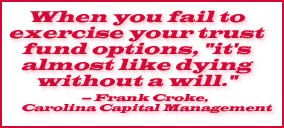|
The trouble with trust funds
|
 |
March 1, 1999: 10:34 a.m. ET
Poorly prepared trust funds can leave your beneficiaries getting burned
|
NEW YORK (CNNfn) - It's been twelve years since "Carol's" husband passed away. Despite the $1 million trust fund he left behind, though, the 80-something Florida woman has had to sell her jewelry, the family boat, and her antique silver collection just to survive.
"Carol," who asked not to be named, said her fight with the bank began even before her husband's death. And it's been a comedy of errors ever since.
"What took place here is hilarious to the point of being criminal," she said. "(The bank which manages the trust) has been bulldozing me down the road and cost me over half a million dollars in what I had to sell (to cover the bills). The first year I had nothing to live on."
It's a long, painful story that never should have happened.
Carol's husband gave her power-of-attorney - a signed document that gave her the right to use the trust fund at her discretion. But a small discrepancy in the final draft of the actual trust (put there by mistake by their lawyer) made it null and void.
Now, the bank and Carol are locked in a bitter legal dispute. And until it's resolved, she's stuck taking what the bank doles out each month under its own internal disbursement policy.
"I take what they give me," she said, adding it wouldn't be enough to live on if she didn't have other sources of income. "It's really the principal of it though; the fact that my husband and I worked all our lives to accumulate this money."
Trusting your trustee
Trust funds have become a popular vehicle for passing on assets to loved ones. When written properly, they are a powerful and effective estate planning tool.
But some advocates for trust fund reform say there are too many "Carols" out there - mostly elderly women who get burned by poorly prepared trust fund documents signed by their unsuspecting spouse.

In the United States, there are just under 2,500 trust departments - most are operated by banks, but a few are operated by independent trust companies and savings and loan institutions.
Collectively, they hold some $805 billion in personal trust fund assets in 850,000 accounts.
Armed with information
Living trusts, one of the more common types of trust funds, are often used by the wealthy to provide for their heirs, and to take advantage of tax savings that the federal government provides.
Under current estate tax credits, you are entitled to leave up to $650,000 to your heirs tax free. Anything beyond that is subject to taxation.
But Frank Croke, head of Carolina Capital Management and author of the book "Family Trusts: Protecting Your Family," said there's a lot more than just taxes to consider.
"Most people believe they have no options; that the tax laws regarding trust funds are very strict," he said. "But you have tons of options."
When you fail to exercise them, he said, "it's almost like dying without a will."
Tailor make your trust
For example, Croke said if you sign a trust without specifying how you want the money invested or divvied up, you are, in effect, allowing the state to decide for you.
In some cases, the surviving spouse winds up getting $20,000 a year to live on - or less, he said.
"The man had the right to say my wife needs $35,000 a year, but he didn't know he had that right and the lawyers don't really know it either," Croke said. "The women are the ones taking a beating."
You can easily prevent that from happening, by simply indicating how much you want your spouse to receive each year.
Make sure you include a 3 percent (or more) cost of living increase each year, and while you're at it, toss in a provision that entitles your spouse to take out an extra $5,000 a year if needed. No questions asked.
You can also write in a provision to cover your childrens' traveling expenses for visits to the nursing home, in the event your spouse ends up there.
And you might consider a clause that allows your spouse to pass on some of that trust money to your children before his or her death.
James D. McLaughlin, director of regulatory and trust affairs for the American Bankers Association, said the sky's the limit when drafting a trust (within the boundaries of the law, of course).
"The trust is a very flexible document," he said. "It all goes back to what the person creating the trust wants."
Of stocks and bonds
Croke said it's important that you specify in your trust how you want your money to be invested.
If you are "silent" on that issue, the bank will generally divide it up for you into stocks and bonds.
But fund managers may take a more conservative approach than you.
"You have the right to say in there that you want it all in stocks, or a higher percentage in stocks than bonds," Croke said. "If you had 75 percent in high growth stocks versus the 50 percent the bank might invest, you'd be 50 percent ahead (in today's high flying market)."

Flexibility is the key
Most beneficiaries who have been burned by poorly written trust funds, say a "trustee removal clause" is the most important item you can include.
Failing to do so makes it nearly impossible for the beneficiary to "fire" the trustee, regardless of how they are handling your fund.
"One of the things we always recommend is that there are provisions for the trustee to be replaced," said Jim McManus, a financial advisor with Sagemark Consulting in Denver.
If you're worried that "Junior" will replace the bank and name his stock broker-best friend the trustee, throw in a provision that requires him to select only from legitimate bank trust departments.
"That way, the onus is on the bank (to perform)," McManus said.
Standish Smith, the head of Heirs Inc., a Villanova, Penn.-based advocacy group for trust fund beneficiaries, said that's good advice.
"We think that competition between banks to manage these trusts would correct a lot of the abuse in the system." he said, likening the industry to a legal and ethical "cesspool."
Despite numerous legal statutes designed to better inform trust fund owners of their options, Smith said "trustee removal clauses" are still left out much too often.
"Even today, still trusts are being written without that clause," he said.
McLaughlin, of the ABA, however, said change has to start with the consumer.
"You are the one signing these documents and the one paying the lawyer," he said. "Everybody should question everything. If a lawyer or trust department makes a specific recommendation ask why, and what the best course of action is for you. Always ask for alternatives."
Lastly, McLaughlin said you should never allow the lawyer drafting your trust to automatically appoint themselves co-trustee, a practice that was more common decades ago but now, he says, rarely occurs.
Do your homework
Despite the horror stories, financial planners say you should not rule out trust funds as a legitimate vehicle for ensuring your assets live on.
Instead, look beyond the tax savings aspect of trusts and carefully consider how you want that money invested and passed on to your heirs.
Consider several lifestyle scenarios for your surviving spouse and make provisions in your trust to cover the costs of such an event.
Spell out everything. Ask lots of questions and don't forget that all-important "trustee removal clause," which gives the beneficiaries the right to fire your trustee if need be.
Lastly, when drawing up a living trust, be sure to have a "pour-over" will in place for peace of mind - a document that transfers into the trust all your assets upon your death. 
--by staff writer Shelly K. Schwartz
|
|
|
|
|
 |

|

